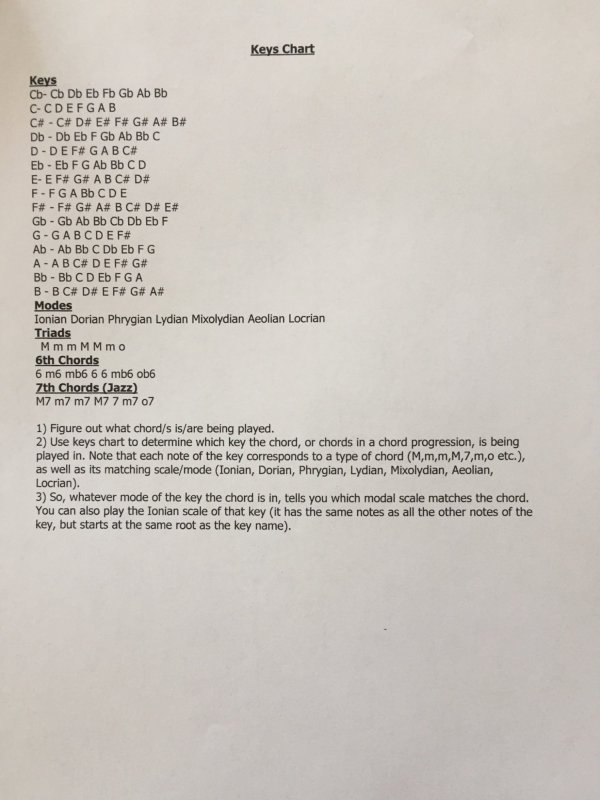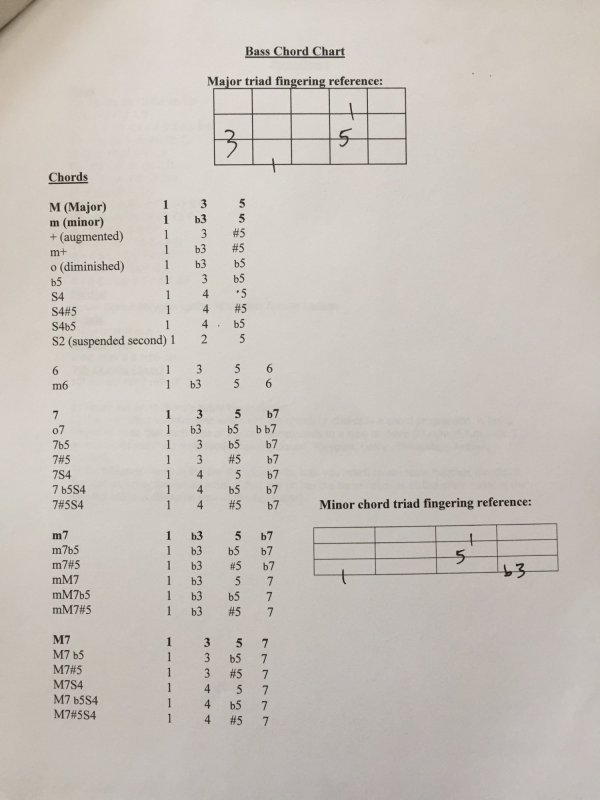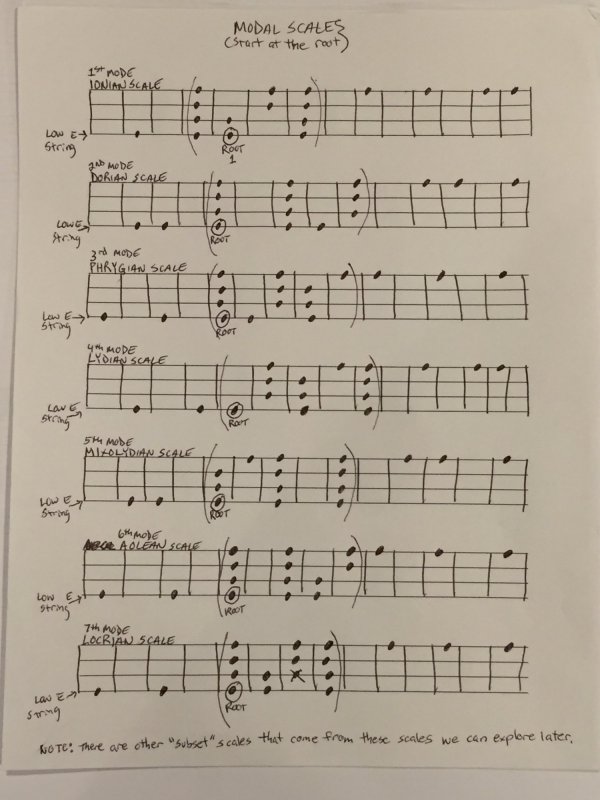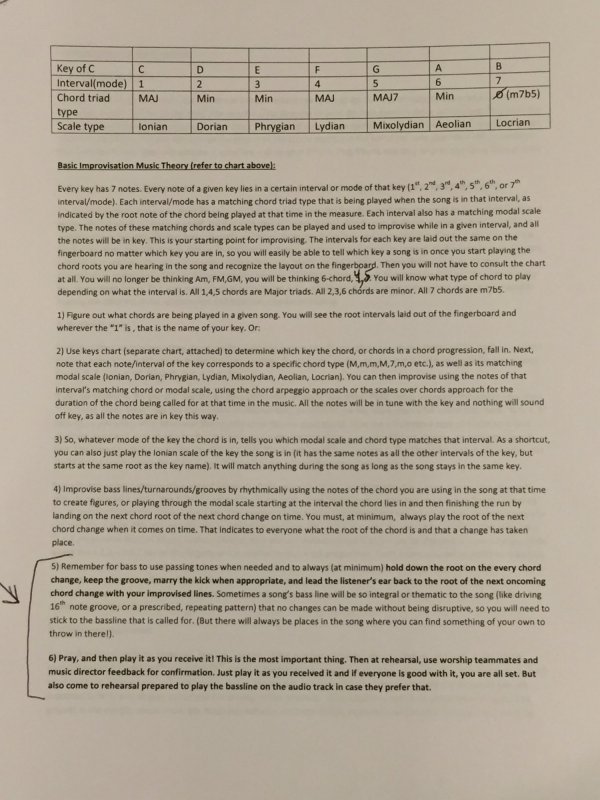You are using an out of date browser. It may not display this or other websites correctly.
You should upgrade or use an alternative browser.
You should upgrade or use an alternative browser.
Been wanting to learn some music theory. Any tips as to where to start?
- Thread starter Rambozo96
- Start date
This is why you learn theory and the associated vocabulary.
Not for me. I wanted to understand how chords were constructed, how they were named, the process behind singing harmonies, and generally why some things sound great together and some don't. Then understanding how chord progressions worked and what made some more interesting than others. I think you can get a ton out of music theory on its own - it's definitely enhanced my experience of playing and listening.
jp
Senior Member
I suggest that you start by learning the theory that will allow you to achieve what you want to learn.
For example, if you want to write your own songs or understand which chords go well together, learn some basic chord theory. If you want to become a better lead player, then some basic scale theory comes in handy. As Coop47 mentions, if you want to learn to sing harmonies, then learn some basic supporting harmony theory and how chords are built. You'll end up learning pieces parts of theory as you go, and you can explore as needed. This is also part of the fun of the journey.
Also, jumping into complex theory like how to use modes will be meaningless unless you have context to apply it. It's possible to just get a high level overview of basic theory without crunching out exercises, i.e., practicing single note arpeggios in every key for all chord types (uggh), to get a better overall picture of how music works.
For example, if you want to write your own songs or understand which chords go well together, learn some basic chord theory. If you want to become a better lead player, then some basic scale theory comes in handy. As Coop47 mentions, if you want to learn to sing harmonies, then learn some basic supporting harmony theory and how chords are built. You'll end up learning pieces parts of theory as you go, and you can explore as needed. This is also part of the fun of the journey.
Also, jumping into complex theory like how to use modes will be meaningless unless you have context to apply it. It's possible to just get a high level overview of basic theory without crunching out exercises, i.e., practicing single note arpeggios in every key for all chord types (uggh), to get a better overall picture of how music works.
lungimsam
Senior Member
- Joined
- Oct 1, 2011
- Messages
- 2,627
- Reaction score
- 1,693
- Guild Total
- 2
Read thru all 4 pages. Three charts and a theory explanation page (the one with most words read first). I used these at a bass theory workshop at church:
Attachments
Antney
Member
- Joined
- Feb 15, 2017
- Messages
- 510
- Reaction score
- 176
I know three major scales:
Doric
Ionic
Corinthian
I don’t wanna sound like a bragger but I know them forward and backwards
seriously, I self taught myself piano when I was 10, and self taught myself guitar shortly afterwards. When I “see” chords or notes I see them on a piano keyboard, my first musical language. I then translate them on to a guitar fretboard, my second language. I can read music, and find tabulature awkward. I don’t know scales, modes, or much else. I have my own, incorrect as it may be, labels for augmented chords... it works for me. The last really big gig I played was very well received, with my dog staying on the couch for the entire performance and my wife left the door open in the room she was reading in. I wish I had more patience to formally learn what I’m doing wrong, but my ADHD won’t let me, and as someone once commented, it would make me sound like everyone else. Best of luck with your experience.
Tom O
Member
Edly's Music TheorI for Practical People is a good book. I took Tony Polocastro's Fretboard Wizard class for music theory. He cuts through all the theory classes he took, and gives the basics for guitar. He covers the basic I, IV, V chord progressions and how t o determine the chords in any scale. He also has you practice learning keys and chords by ear on recorded songs (many Bluegrass).
fronobulax
Bassist, GAD and the Hot Mess Mods
- Joined
- May 3, 2007
- Messages
- 24,773
- Reaction score
- 8,901
- Location
- Central Virginia, USA
- Guild Total
- 5
As an aside, I don't really consider knowing how to read music an integral part of music theory. I learned to read music and applied that skill long before I understood anything about intervals or chords. I don't need to understand what a chord progression is in order to play what is on the page. Learning what someone else played is easier (for me) to do by reading a transcription of what they played than grabbing an instrument and playing a recording over and over and trying to figure it out by pitch matching and ear.
Music theory, while of intellectual interest on its own, becomes most useful when composing or improvising. Your ear will tell you what sounds good, but music theory will help you in predicting what is going to sound good before you actually play it.
Music theory, while of intellectual interest on its own, becomes most useful when composing or improvising. Your ear will tell you what sounds good, but music theory will help you in predicting what is going to sound good before you actually play it.
- Joined
- Feb 11, 2009
- Messages
- 23,176
- Reaction score
- 18,904
- Location
- NJ (The nice part)
- Guild Total
- 112
I learned to read music playing the clarinet. When I got to guitar, my brain just locked up when I got to chords because you can’t play chords on a clarinet. That caused me to give up on guitar lessons because my teacher was kind of a jerk.
In my 40s I took lessons again in part to learn more theory. When I told that story the new teacher said, “I just see a pile of thirds” and a whole universe clicked into place in my head.
Chords are combinations of thirds. The type and number of thirds being the way chords are identified. It’s what makes a minor chord sound different than a major chord. Add another third and you’ve got a 7th chord. It’s all just thirds.
A lifetime of music misunderstood because an idiot “teacher” couldn’t explain that to me.
In my 40s I took lessons again in part to learn more theory. When I told that story the new teacher said, “I just see a pile of thirds” and a whole universe clicked into place in my head.
Chords are combinations of thirds. The type and number of thirds being the way chords are identified. It’s what makes a minor chord sound different than a major chord. Add another third and you’ve got a 7th chord. It’s all just thirds.
A lifetime of music misunderstood because an idiot “teacher” couldn’t explain that to me.
Darryl Hattenhauer
Venerated Member
Lately lydian
I ionian,
don't dorian,
play phrygian
loud locrian
any- aeolian
more mixolydian
I ionian,
don't dorian,
play phrygian
loud locrian
any- aeolian
more mixolydian
fronobulax
Bassist, GAD and the Hot Mess Mods
- Joined
- May 3, 2007
- Messages
- 24,773
- Reaction score
- 8,901
- Location
- Central Virginia, USA
- Guild Total
- 5
Chords are combinations of thirds.
I really want to say that is not right. But if we qualify it by saying common or easily named chords then I am with you.
To be clear two notes played together are usually called a chord or an interval. Three or more are a chord. Playing C, D, E simultaneously is a chord but it is not easily named. In non-guitar contexts there are often chords that are built without stacking thirds.
Last edited:
Cougar
Enlightened Member
Ha. That's what I was going to suggest. It seems to be that music theory is pretty straightforward on a keyboard. I think I have a pretty good grasp of it, but I really wouldn't know where to start.....Only half in jest, friends. Buy a Piano? That's what I learned on in music school in the mid 70's.
- Joined
- Feb 11, 2009
- Messages
- 23,176
- Reaction score
- 18,904
- Location
- NJ (The nice part)
- Guild Total
- 112
I really want to say that is not right. But if we qualify it by saying common or easily named chords then I am with you.
To be clear two notes played together are usually called a chord or an interval. Three or more are a chord. Playing C, D, E simultaneously is a chord but it is not easily named. In non-guitar contexts there are often chords that are built without stacking thirds.
You’re being pedantic.
Here's one of the drawings I did when I was going to write about it.
Fun sort of related fact: the theme from jaws is menacing because it’s a minor second and your brain REALLY wants that progression to resolve to a major second but it never does.
Last edited:
fronobulax
Bassist, GAD and the Hot Mess Mods
- Joined
- May 3, 2007
- Messages
- 24,773
- Reaction score
- 8,901
- Location
- Central Virginia, USA
- Guild Total
- 5
You’re being pedantic.
And that's a surprise?
Some of it comes from context. If you are only dealing with one instrument, guitar, there are limitations on "practical" chords. But if you are dealing with a choir or an orchestra there are a whole lot more possibilities.
ladytexan
Senior Member
I'm a little late to the party, but sounds like a lot of great ideas have already been posted. Know your progressions.....which you probably already do. When we see a song written in the key of G, we, automatically, know the basic chords, one sharp (F#). Mathematical.......Beethoven was a master of using math when writing.
- Joined
- Jan 1, 2017
- Messages
- 2,164
- Reaction score
- 2,581
- Guild Total
- 4
Rambozo, are you sorry you asked, yet?!
- Joined
- Feb 11, 2009
- Messages
- 23,176
- Reaction score
- 18,904
- Location
- NJ (The nice part)
- Guild Total
- 112
I’m not sure what point you’re trying to make with that last post, but theory is complicated and can be hard to explain.
Antney, do you know you posted everything at least twice? I agree with your overall sentiment - i.e., it's confusing as he11 - but that's a bit of overkill! 
walrus
walrus
fronobulax
Bassist, GAD and the Hot Mess Mods
- Joined
- May 3, 2007
- Messages
- 24,773
- Reaction score
- 8,901
- Location
- Central Virginia, USA
- Guild Total
- 5
...and here is the problem with theory:
from our LTG thread alone
I'll bet you probably gave up and said "Math is hard", too.
I don't think anyone is claiming Music Theory is easy. What you, justifiably, see as Too Much Information is the result of a vague question. If we had a focus - I think I want to study some music theory so that I can play lead guitar over blues progressions - there would have been have much more that you could have grasped.
Antney
Member
- Joined
- Feb 15, 2017
- Messages
- 510
- Reaction score
- 176
My point is it IS difficult, and there are so many people trying to simplify it with color coded charts, easy to learn books, simple explanations on how it “really works” etc, etc, etc.
Sorry for the double post, not sure how that happened, they must have explained how not to double post in math class after I dropped out of it I guess
Sorry for the double post, not sure how that happened, they must have explained how not to double post in math class after I dropped out of it I guess



